Who are the burger kids?
Cultures from across the world have fun terms to define third culture kids

Dubai: Do you speak your mother tongue with a foreign accent? Do you look in surprise every time your parents refer to something from your home country? Or do you have to name two or more countries every time someone asks, “Where are you from?”?
If your answer to all these questions is ‘yes’, you are probably a third-culture kid.
Dr Ruth Hill Useem, who coined the term, defines a third culture kid as a person who has spent a significant part of his or her developmental years outside their parents’ culture. But most countries choose more colourful and quirky terms to describe the children they see out of place in their own homeland.
Gulf News spoke with residents from various nationalities to find out how they refer to children who struggle with this disconnect.
Nida Gulzar, a 17-year-old Pakistani national living in Sharjah, has been called a ‘burger’ more times than she can remember. The term, according to her, is an endearing way of referring to someone who doesn’t understand jokes that require an understanding of certain aspects of life in Pakistan, or appreciating traditional food because it might be too spicy.
“I think the term comes from the food item ‘bun kebab’, which is a traditional sandwich. Pakistanis would call it bun kebab but a Westernised child would refer to it as a burger. I think that’s where the joke comes from,” she said.
Filipinos, too, have curious ways of referring to third-culture kids. Leslie S., a Dubai resident, remembers calling some of her nieces and nephews ‘G.I. Joe kids’.
“In the Philippines, the language is very different depending on which part of the country you come from. I belong to the Pampanga province, which is in the northern part of the Philippines and there we had one of the biggest US Naval Force base in Clark Field and that is why there were a lot of Americans back in the 1990s. I think that is where the term came from,” she said.
Arabs, too, have many fun ways of labelling some of the behaviour they see in third culture children.
Mohammad Al Shurafa, a Jordanian college student studying in Lebanon, said that a lot of the students who come from the US are referred to as ‘Men’ezel’, which means socially awkward.
Despite all the good-natured ribbing that third culture kids might have to face when they go back home, they also have an edge in certain aspects, according to UAE-based anthropologist Dr Joanna Seraphim.
“They are clearly more open-minded and tolerant because they have seen and experienced things that are different from the people in their own country. For example, a person in the UAE has tried lugemat (fried dumplings) from the UAE, masala chai from India, attended the Chinese New Year festivities and had iftar with friends. They would have all these experiences that they don’t have in their own country. Culturally speaking, they are getting richer,” she told Gulf News.
However, a sense of belonging is a major challenge that they might face.
“One of my sisters was born and raised here in the UAE and she was not able to go back to France and live there because her way of doing things was different. She went into mini conflicts because the way people dealt with things was very different there compared to what she was used to,” Dr Seraphim said.
This struggle is common to most third culture kids but because they build their sense of identity from people rather than places, they are also slowly building a world that is less divided, according to Dr Seraphim.
Danabelle Gutierrez, a 28-year-old writer, agreed. Gutierrez who left the Philippines at the age of 7 has since then lived in Cairo, Vienna and Muscat before moving to the UAE.
“I think growing up in culturally diverse cities and being immersed in all those different cultures forces you to be adaptable, and it teaches you tolerance and acceptance, knowing that there, literally, is a whole different world outside of your backyard,” she told Gulf News.
She added that the experiences are also helpful when looking for a job. However, she also agreed that finding a place to call ‘home’ can be one of the biggest challenges.
“The challenge is knowing the word ‘home’, but not having a feeling to attach to the sound of it.”
Sign up for the Daily Briefing
Get the latest news and updates straight to your inbox

